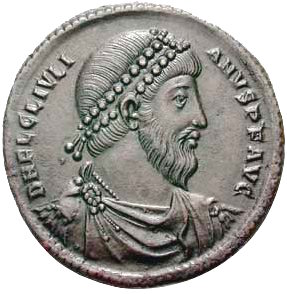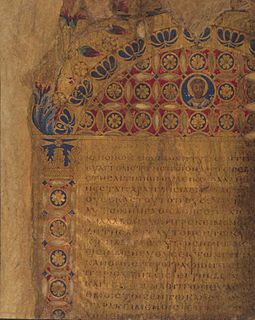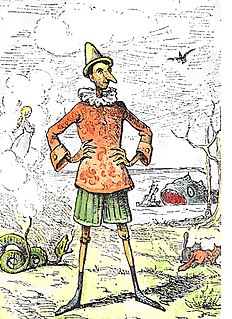Related Research Articles

Quintus Horatius Flaccus, known in the English-speaking world as Horace, was the leading Roman lyric poet during the time of Augustus. The rhetorician Quintilian regarded his Odes as just about the only Latin lyrics worth reading: "He can be lofty sometimes, yet he is also full of charm and grace, versatile in his figures, and felicitously daring in his choice of words."

Julian was Roman emperor from 361 to 363, as well as a notable philosopher and author in Greek. His rejection of Christianity, and his promotion of Neoplatonic Hellenism in its place, caused him to be remembered as Julian the Apostate in Christian tradition.

Libanius was a Greek teacher of rhetoric of the Sophist school. During the rise of Christian hegemony in the later Roman Empire, he remained unconverted and in religious matters was a pagan Hellene.
Greek literature dates back from the ancient Greek literature, beginning in 800 BC, to the modern Greek literature of today.
Marcus Cornelius Fronto, best known as Fronto, was a Roman grammarian, rhetorician, and advocate. Of Berber origin, he was born at Cirta in Numidia. He was suffect consul for the nundinium of July-August 142 with Gaius Laberius Priscus as his colleague. Emperor Antoninus Pius appointed him tutor to his adopted sons and future emperors, Marcus Aurelius and Lucius Verus.

Callimachus was an ancient Greek poet, scholar and librarian who was active in Alexandria during the 3rd century BC. A representative of Ancient Greek literature of the Hellenistic period, he wrote over 800 literary works in a wide variety of genres, most of which did not survive. He espoused an aesthetic philosophy, known as Callimacheanism, which exerted a strong influence on the poets of the Roman Empire and, through them, on all subsequent Western literature.

An epistle is a writing directed or sent to a person or group of people, usually an elegant and formal didactic letter. The epistle genre of letter-writing was common in ancient Egypt as part of the scribal-school writing curriculum. The letters in the New Testament from Apostles to Christians are usually referred to as epistles. Those traditionally attributed to Paul are known as Pauline epistles and the others as catholic epistles.

The Pauline epistles, also known as Epistles of Paul or Letters of Paul, are the thirteen books of the New Testament attributed to Paul the Apostle, although the authorship of some is in dispute. Among these epistles are some of the earliest extant Christian documents. They provide an insight into the beliefs and controversies of early Christianity. As part of the canon of the New Testament, they are foundational texts for both Christian theology and ethics. The Epistle to the Hebrews, although it does not bear his name, was traditionally considered Pauline, but from the 16th century onwards opinion steadily moved against Pauline authorship and few scholars now ascribe it to Paul, mostly because it does not read like any of his other epistles in style and content. Most scholars agree that Paul actually wrote seven of the Pauline epistles, but that three of the epistles in Paul's name are pseudepigraphic and that three other epistles are of questionable authorship. According to some scholars, Paul wrote these letters with the help of a secretary, or amanuensis, who would have influenced their style, if not their theological content.

Pseudepigrapha are falsely attributed works, texts whose claimed author is not the true author, or a work whose real author attributed it to a figure of the past.

Ancient Greek literature is literature written in the Ancient Greek language from the earliest texts until the time of the Byzantine Empire. The earliest surviving works of ancient Greek literature, dating back to the early Archaic period, are the two epic poems the Iliad and the Odyssey, set in an idealized archaic past today identified as having some relation to the Mycenaean era. These two epics, along with the Homeric Hymns and the two poems of Hesiod, Theogony and Works and Days, constituted the major foundations of the Greek literary tradition that would continue into the Classical, Hellenistic, and Roman periods.

Byzantine literature is the Greek literature of the Middle Ages, whether written in the territory of the Byzantine Empire or outside its borders. It forms the second period in the history of Greek literature after Ancient Greek literature.
Marcellus Empiricus, also known as Marcellus Burdigalensis, was a Latin medical writer from Gaul at the turn of the 4th and 5th centuries. His only extant work is the De medicamentis, a compendium of pharmacological preparations drawing on the work of multiple medical and scientific writers as well as on folk remedies and magic. It is a significant if quirky text in the history of European medical writing, an infrequent subject of monographs, but regularly mined as a source for magic charms, Celtic herbology and lore, and the linguistic study of Gaulish and Vulgar Latin. Bonus auctor est was the judgment of J.J. Scaliger, while the science historian George Sarton called the De medicamentis an “extraordinary mixture of traditional knowledge, popular (Celtic) medicine, and rank superstition.” Marcellus is usually identified with the magister officiorum of that name who held office during the reign of Theodosius I.

Ancient Egyptian literature was written in the Egyptian language from ancient Egypt's pharaonic period until the end of Roman domination. It represents the oldest corpus of Egyptian literature. Along with Sumerian literature, it is considered the world's earliest literature.

Byzantine studies is an interdisciplinary branch of the humanities that addresses the history, culture, demography, dress, religion/theology, art, literature/epigraphy, music, science, economy, coinage and politics of the Eastern Roman Empire. The discipline's founder in Germany is considered to be the philologist Hieronymus Wolf (1516–1580), a Renaissance Humanist. He gave the name "Byzantine" to the Eastern Roman Empire that continued after the Western Roman Empire collapsed in 476 AD. About 100 years after the final conquest of Constantinople by the Ottomans, Wolf began to collect, edit, and translate the writings of Byzantine philosophers. Other 16th-century humanists introduced Byzantine studies to Holland and Italy. The subject may also be called Byzantinology or Byzantology, although these terms are usually found in English translations of original non-English sources. A scholar of Byzantine studies is called a Byzantinist.
Siburius, for whom only the single name survives, was a high-ranking official of the Roman Empire. He was one of several Gauls who rose to political prominence in the late 4th century as a result of the emperor Gratian's appointment of his Bordelaise tutor Ausonius to high office.

Literature broadly is any collection of written work, but it is also used more narrowly for writings specifically considered to be an art form, especially prose fiction, drama, and poetry. In recent centuries, the definition has expanded to include oral literature, much of which has been transcribed. Literature is a method of recording, preserving, and transmitting knowledge and entertainment, and can also have a social, psychological, spiritual, or political role.
Calliopius was a Greek rhetor and official of the Roman Empire.
Alexandra was a Greek noblewoman.

A letter collection or collection of letters consists of a publication, usually a book, containing a compilation of letters written by a real person. Unlike an epistolary novel, a letter collection belongs to non-fiction literature. As a publication, a letter collection is distinct from an archive, which is a repository of original documents.

Lieve Van Hoof is a Belgian classical scholar and Research Professor at the University of Ghent. She specialises in work on the socio-political role of Greek and Latin literature in the Roman Empire. Van Hoof is currently engaged in examining Greek and Latin letters in order to understand lobbying in late antiquity. Van Hoof is known in particular for her work on Plutarch and Libanius.
References
- 1 2 3 "Epistolography" in The Oxford Dictionary of Byzantium , Oxford University Press, New York & Oxford, 1991, p. 718. ISBN 0195046528
- ↑ Cameron, A. (1998) "Education and literary culture" in Cameron, A. and Garnsey, P. (eds.) The Cambridge ancient history: Vol. XIII The late empire, A.D. 337-425 . Cambridge: Cambridge University Press, p. 696.
- ↑ Jones, A.H.M. (1964) The later Roman empire 284-602: A social, economic, and administrative survey. Volume II. Oxford: Basil Blackwell, p. 1004. ISBN 0631149651